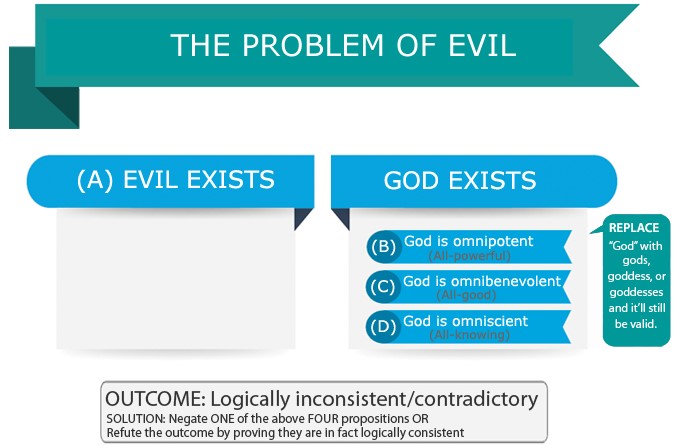Reference




OpenAI's Answer
The "Problem of Evil" is a significant philosophical and theological issue that questions how to reconcile the existence of evil with the idea of an all-powerful, all-knowing, and benevolent God. There are several approaches to this issue, each offering different perspectives and arguments. Here are some of the primary approaches:
-
Logical Approach: This involves addressing the logical inconsistencies between the existence of evil and the attributes of God. It aims to show that the presence of evil does not logically contradict the existence of an omnipotent, omniscient, and benevolent God. Notable proponents include Alvin Plantinga, who argued that free will could justify the existence of evil.
-
Evidential Approach: This approach acknowledges that while the existence of evil might not logically contradict the existence of God, the sheer amount and severity of evil make the existence of a benevolent God unlikely. This approach is often used by atheists to argue against the likelihood of such a deity.
-
Theodicy: These are specific responses that attempt to justify God's permitting of evil. Notable theodicies include:
- Free Will Theodicy: Argues that God gave humans free will, which allows for the possibility of moral evil.
- Soul-Making Theodicy: Suggests that evil and suffering are necessary for spiritual growth and the development of virtues such as courage and compassion.
- Best Possible World Theodicy: Proposes that the world, with all its evils, is the best possible world that God could create, balancing various goods and evils.
-
Existential and Pastoral Approaches: These approaches focus on the personal and practical aspects of dealing with evil and suffering, helping individuals find meaning and hope despite the presence of evil. This can involve turning to faith for comfort and seeking to help and support those who suffer.
-
Comparative-Relative Approach: This examines the problem of evil by comparing it to other moral issues and considering the overall context relative to our understanding of good and evil. It suggests that what might appear as evil can sometimes lead to a greater good or have justifications that are not immediately apparent.
Further Reading and Resources
- Stanford Encyclopedia of Philosophy: The Problem of Evil
- Internet Encyclopedia of Philosophy: Logical Problem of Evil
- Wikipedia: Problem of Evil
- Books on Trial: The Problem of Evil
- Whole Reason: Three Approaches to the Problem of Evil
For visualization and more detailed explanations, you can explore images and infographics on the topic:


These resources provide a comprehensive overview of the various approaches to tackling the problem of evil and offer further insight into this profound issue.
Follow Up
Related
CHAPTER 2 - Literature Review 2.1. Introduction This chapter undertakes a review of literature to
What are the key contributions to addressing ethnic and socioeconomic disparities in cancer survivor
How did the public react to Address Unknown when it was first published?
What motivated Kathrine Taylor to write the novel Address Unknown?
What is the significance of the relationship between Martin and Max in Address Unknown?